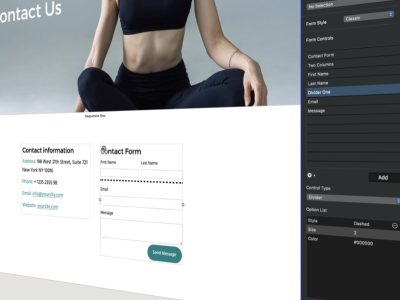For many EverWeb users, organizing the assets in your Assets List may not be something that you really need to pay attention to, but if your project relies on images and other forms of media, having a well organised assets list may save you time and effort. In EverWeb 3.8, a new asset related feature now allows you to organise your assets by the pages of your site.
What Is An Asset?
An asset in EverWeb is an image file such as a photo, drawing or painting. EverWeb supports many different Asset file format types such as JPG, PNG, TIFF and GIF for example. Additionally, other file types are also included in the Assets list such as audio and video files and the PDF document format standard.
Why Would You Need to Organize Your Project’s Assets?
One of the great features of the Assets List is that the files that are stored there can be reused on any page in your project file once it has been added tot he project file. Usually adding an image file, or other media type, to your project is done simply by drag and dropping the file you want from its source either on to the page your are working on, or directly in to the Assets List in the Assets tab.
If you use a lot of images in your project file and need to reuse these images on more than one page, management of these files starts to become important. If your image assets are well organised by using good file names and folders, this can save you much time and effort. Sometimes, even a small website of a few pages can benefi from this approach. Remember as well, that simple things like properly names image files is also beneficial to your site’s SEO.
EverWeb has an array of asset management tools that enable you to structure your assets in the way in which suits your own needs best. For more information on general asset management, the EverWeb User Manual is a great place to look as there is a whole chapter dedicated to the subject. Alternatively you can access EverWeb’s YouTube video library or our own blog posts on asset management.
EverWeb’s New Page by Page Asset Organizing Tool
Since EverWeb 3.0 you have been able to organize your image assets in to folders and subfolders. There’s even a Search box so you can quickly locate image assets in the Assets Tab if you need to. Another quick method of finding an asset in the Assets List, if you already know the file name, is to use predictive search. Just click on the Assets tab then click on the first asset in the list and start typing the name of the asset you are looking for. EverWeb will use your keyboard input to locate the file quickly as you type.
In our latest version 3.8 release of EverWeb, you can now collect together all of the image assets of a specific page in to their own dedicated folder in the Assets List just with a couple of mouse clicks! It’s super easy to do and will help you get your Assets List organized in no time!
Creating a Folder for Image Assets on the Current Page
Start by selecting the page you want to create an Assets List folder for.
Click on the Assets Tab
Click on the Settings Cog/Button and choose the option ‘Select All Assets On Current Page’
You will notice that all of the image assets on the current page will be highlighted in the Assets List.
Now click on the ‘+’ button to add a new Assets List folder.
Name the folder as required e.g. the name of the current page.
The selected assets will now be added in to your new folder.
Repeat the above steps for other pages whose assets you want to group in the same manner.
The new Assets List feature is a simple, yet quick and effective way to keep your image assets manageable and organized in page related folders. Let us know in the Comments Section below if you this feature is useful and what other asset related features you would like to see in future versions of EverWeb!










Comments